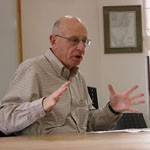
JERUSALEM — Stumbling and kvetching. These are our themes. And perhaps not only Israel’s.
Set in the context of a pandemic, as yet without a date for vaccine, along with plenty of arguments among the professionals about transmission, infection rates, treatment of the ill, and how to deal with those not yet infected.
Plus plenty of politics, with paid lobbyists, articulate advocates, real suffering of those not able to work, and lots of preferences. Along with a corrupt Prime Minister, who still has considerable support, and a close balance between major political blocks with trading favors.
The results: stumbling between proposals and government decisions, plus fatigue and disbelief in the public adding to the problem of poor administration of whatever complex arrangements are made by the politicians.
And two substantial sectors: the ultra-Orthodox and the Arabs, generally on the outside of the establishment, many of whose members do what they want, or what their rabbis or local leaders indicate as the preferences of the moment.
Both communities have disproportional infection rates, and much resistance to imposing controls.
Presently we’re stuck at between 1,500 and 2,000 new cases per day, registered as ill. Who knows how many more?
We’ve appointed a Czar. But he’s not quite that. He continues to struggle with committees of politicians in order to enact what he chooses.
And lots of independent souls. The head of the physicians demanded a full closure, for two or three weeks, in order to get ready for the opening of schools on September 1. He did that as an individual, but holding an important position. The immediate response was a rebellion of many physicians disclaiming his authority or superior expertise.
And at a time when the limits on enclosed meetings was somewhere between 10, 20, 50, or 250 (difficult to say on account of frequent changes), the marriage of a leading ultra-Orthodox rabbi’s grandson produced a much larger assembly of perhaps 3,000, many without masks and dancing together, likely to serve as yet another nest of infections.
We’re scheduled to open the skies in less than a week, with 10 countries whose residents will be allowed to visit. But so far no mention of which countries.
So we stumble and kvetch. Moving this was and that, with major meetings going for days and not deciding anything, or leaving major issues unclear. Decisions are detailed, and change with their setting. So who knows what’s permitted
The Prime Minister urges a general closing, or at least during weekends or at nighttime (the major occasions for protests against him as Crime Minister), with major streets close to his personal home blocked with long lines of barriers, leaving no where for the protests to assemble.
The police support, and protect demonstrators, but also seek to keep them in the framework of agreed times. Recently weekend demonstrations of 15,000 near the official Prime Minister’s residence in Jerusalem, and another 1,000 near his personal residence along the coast.
We can pity the individuals living close to the Prime Minister’s Jerusalem residence, or his personal home along the coast, or the home of the Minister of Domestic Security, where there are more or less continued demonstrations, along with noise makers and amplifiers, going on until the agreed closing, and often later, with individuals relieving themselves along the street.
It’s hard to sort out those who are angry. Some are Likud supporters, or former Likud supporters, fired up by being out of work with limited or no actual aid. Others are the young, middle aged, and elder, fed up with the Crime Minister. They’re all termed leftists, anarchists, supported–according the Bibi–by the wealthy who dine at the Waldorf Astoria, but there is limited or no evidence for the Prime Minister’s claims.
The country needs a budget in two weeks, or the Knesset dissolves and calls an election. There’s a commitment for a two-year budget written into the coalition agreement, but the Prime Minister and his supporters are insisting on a one-year budget. Which would actually be a two-months budget by the time it might be passed. But Benny Gantz continues to insist on a two-year budget, actually one that would provide for about 15 months.
Without an agreement, can the schools open? Even though there is no agreement as to which classes would actually meet? As well as shortfalls in the funding of hospitals and medical facilities, plus other social services?
Currently there’s a proposal to defer consideration of a budget. Would this do anything more than postpone the inevitable election? And Bibi has indicated his opposition to that proposal. We’ll see how it plays out.
There have been infected individuals who violated all the norms. One flew to Ukraine to visit with his father. Another took a bus along with family members to visit Tiberias.
Will we ever know how many were infected along their ways?
Lots of stumbling and reasons to kvetch.
Meanwhile the stock markets, here and in the US, have been doing reasonably well.
And the explosion in Beirut might provide us with some quiet on the northern front, as well as providing an opportunity to offer aid and to deal more thoroughly with a similar assembly of noxious and dangerous chemicals in the Haifa port.
But an uptick in incendiary balloons coming from Gaza raises the question of regional quiet.
To what extent are our American, European, and distant Asian friends dealing with the crisis? It varies from place to place, but we’re all still distant from a vaccine and suffering waves of infection.
*
Ira Sharkansky is professor emeritus of political science at Hebrew University. He may be contacted via ira.sharkansky@sdjewishworld.com